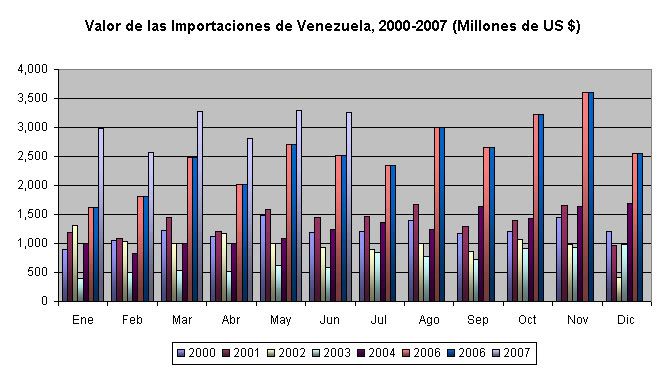Saturday, December 15, 2007
Contradictions of Resource Populism posted by Yoshie
Venezuela's Interior Minister Pedro Carreño got caught criticizing capitalism while sporting Gucci shoes and a Louis Vuitton tie:Asked if it wasn't contradictory to criticize capitalism while personally preferring imported luxuries, the minister stammered a bit and finally said: "No es contradictorio, porque yo quisiera que Venezuela produjera todo eso y entonces yo comprar todo lo que se produzca aquí y no tener que importar el 95 por ciento de los rubros que consumimos [It's not contradictory, for I would prefer Venezuela to be producing all this, and then I could buy what's produced here instead of having to import 95% of what we consume]" (Enrique Andrés Pretel, "Ministro venezolano en apuros para defender socialismo de Chávez," Reuters, 13 December 2007).
Unlike right-wingers, who are having a field day with this video, the charge of hypocrisy does not interest me.1 Who can blame the minister for wishing to wear nice clothes?
But a question may be still asked: does the minister know that his European brand fashion items may not have been made by high-wage European craftsmen but low-wage East Asian workers, the only thing "European" about them being their prices?
In fact, many luxury-brand items today are made on assembly lines in developing nations, where labor is vastly cheaper. I saw this firsthand when I visited a leather-goods factory in China, where women 18 to 26 years old earn $120 a month sewing and gluing together luxury-brand leather handbags, knapsacks, wallets and toiletry cases. One bag I watched them put together -- for a brand whose owners insist is manufactured only in Italy -- cost $120 apiece to produce. That evening, I saw the same bag at a Hong Kong department store with a price tag of $1,200 -- a typical markup. (Dana Thomas, "Made in China on the Sly," New York Times, 23 November 2007)
Then, there remains another question, suggested by the minister's reply itself: is Venezuela making progress in overcoming the Dutch disease (higher oil prices overvaluing the currency, making imports comparatively cheaper and underdeveloping the domestic non-oil production)? The import trends charted by Venezuela's National Statistics Institute are not exactly encouraging.
Productive investment in general is clearly lagging behind consumption, and manufacturing is among the most shortchanged sectors (Oil Wars' notes below are based on the Banco Central de Venezuela, "El PIB aumentó 8,7% durante el tercer trimestre de 2007," 15 November 2007):
The fastest growth was in communications at 24.3% followed by commerce at 18.4% and then transportation at 15.5%. The lagging sectors were manufacturing at 7.7% and construction at 4%. Note that both manufacturing and contruction were both slower than growth in the economy as a whole. Clearly the increasing overvaluation of the Venezuelan economy is stunting manufacturing growth and keeping it below what it should be.
Interstingly the bank noted that agricultural production as been increasing at an average of 15% since 2005. So what shortages there are clearly result from increased demand not falling output.
In more general numbers imports were up 30.9% (is this good or bad?), consumption by consumers is up 20.4% (I guess this makes for happy voters), and fixed capital investment is up 17.3% which the government attributes to increased imports of machinery. However, for some time now we have seen investment go way up while production seems to be increasing but at a much slower rate. ("Yawn," Oil Wars, 15 November 2007)
It looks like the day when the minister can buy at home everything he can possibly want is far from close, and he is not personally setting a great example of swadeshi for the rest of the nation to follow.
The unfortunate spectacle of Louis Vuitton socialism came at about the same time as the news of removal of the price controls on long-life milk and shortly after the defeat of the Constitutional Reform. The beginning of December 2007 may be remembered as the time when contradictions of resource populism in Venezuela became more visible than before. Chavistas will have to overcome them to stay in power and further transform the nation. But how?
1 Some Venezuelan leftists, however, may not let the minister off the hook so easily on the hypocrisy question:
Y con una corbata Louis Vuitton y unos zapatos Gucci tú no puedes venir a decirme que estás poniendo los intereses colectivos por encima de los individuales, mucho menos si tu respuesta a las críticas es que en Venezuela "no se fabrican" corbatas ni zapatos. . . no me jodas, que en estos momentos tengo puestos unos zapatos venezolanos Vic Matic bien bonitos, que cuestan 120 mil bolívares y me han durado 2 años ya. [And with a Louis Vuitton tie and Gucci shoes on, you can't come to tell me that you are putting collective interests above individual ones, much less if you respond to your critics by saying that ties and shoes are "not being manufactured" in Venezuela. . . . Don't kid me. At this very moment I am wearing very pretty Vic Matic Venezuelan shoes, which cost me 120,000 bolivars and have lasted for the last two years] (Luigino Bracci Roa, "Pedro Carreño y la corbata Louis Vuitton, o cuando la oposición tiene toda la razón. . . ," El espacio de Lubrio, 13 December 2007)
Is it time for Venezuelan officials to begin to emulate the sartorial rectitude of their Iranian counterparts who still frown upon the kravati?
But news from the department of government procurement is worse than news from the fashion department: the Venezuelan government just gave KBR a $57 million dollar contract to build an ammonia plant ("When Will They Put Their Money Where Their Mouths Are?" Oil Wars, 14 December 2007).
Update
Read it in Spanish: Yoshie Furuhashi, "¿Socialismo Louis Vuitton en Venezuela?" Traducción de Julio Fernández Baraibar, Critical Montages, 19 December 2007.
Labels: capitalism, class, venezuela











